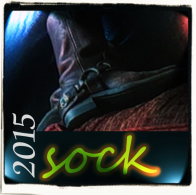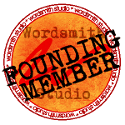I am writing this while looking out the window at nodding daffodils after a week spent appreciating the season of spring blooms, driving through 10 east coast states. Apple blossoms, weeping cherries, dogwoods, azaleas, forsythia, Bradford pears, redbud, wild wisteria, and the last bedraggled heads of tulips.
 No small deal to me, as this was my first spring back in the northeast after years in South Florida’s tropics.
No small deal to me, as this was my first spring back in the northeast after years in South Florida’s tropics.
It’s also been a great week for writing. Two new business writing clients. Writing academic curriculum. Analyzing the structure of recent breakout novels. Celebrating the creativity of my clients and my writing community (including Wordsmith Studio’s continuing anniversary celebrations). And — no offense to all of that, but — most overjoyed by work on my novel. Revision to this story is like discovering hidden doors. This story — the one coming vivid, the writing on a roll, where it dragged when I knew the story was not yet ready — is the one I knew was there all along, so I couldn’t be happier.
That said, this post marks a return of Friday Links for Writers, which was on hiatus during my winter masters work. This week shares some of my favorite recent reads on process, form, inspiration and publication. As always, let me know in the comments what resounds with you, or what you are currently trying to learn more about. Feel free to share your own links. Have a great writing week!
* * * * *
Tips for Non-converging Parallel Plot Lines
In a recent workshop, when trying to simplify my narrative to a logline to practice pitching with workshop peers, I realized that one of the complications I was working on is that my novel unfolds in nonlinear, parallel, converging plot lines. While conventional advice tends to steer toward linear lines, there are several different forms for parallel plot lines, in linear and nonlinear forms. This piece takes on one of the more interesting: non-converging (two stories that don’t cross). I share it as much for that discussion as the additional links on other structures.
496 Words on Writing Flash Prose
Some of my writing friends are kings and queens of writing flash prose, and I can’t help envy them. Envy the crossing of all those finish lines, all those publications come to light. It’s therefore no surprise that I loved this short piece by Rebecca Meacham on Ploughshares’ blog about how she yields flash prose from her novel scraps.
The One Word You Should Probably Add to Twitter Searches
This was one of my favorite pieces on research this week, as Daniel Victor shares some common sense but not obvious advice for honing in on first person sources. The trick isn’t just the word to include, but the simple logic behind it. This was frequently shared by my journo friends.
I am sure I’m not alone in appreciating this piece, in which Nanea Hoffman confesses how a need for perfection in her writing has held her back. It’s a great tonic if you need permission to let go and just get something submitted.
Matthew Weiner’s Reassuring Life Advice for Struggling Artists
Close on the heels of that theme, Mad Men creator Matthew Weiner reassures emerging artists by pulling back the veil that implies real genius is effortless. The Fast Company essay suggests all masterpieces involved false starts, deletions and revision, saying that “hiding brushstrokes” does a disservice to emerging artists.
Her Stinging Critiques Propel Young Adult Best Sellers
To be on the receiving end of an editorial letter from Julie Strauss-Gabel may sting, but I can’t help think how empowering it would be to work with an editor with such vision. You might know her as the Dutton editor for John Green, whose experiences working with her are shared. In retracing the arc of her career, this is also a fascinating glimpse into the growth of young adult fiction.
This Week in Fiction: Colm Tóibín
I usually try to end with the perspective of one writer. Here, it’s interesting to read Colm Toibin’s observations and creative process as he discusses writing his story, “Sleep” with Deborah Treisman, in the New Yorker.
* * * * *
How About You?

I love this sign from Atlantic Center for the Arts, which comes on the heels of a sign asking the public not to venture beyond a point where the center is reserved for artists. c Elissa Field
What challenges are you working on in your writing this week, or what resources have helped you find clarity toward your goals? We’d love to hear from you — share your thoughts or links in the comments.
Better yet… Have you read my posts for Wordsmith Studio’s 3rd Anniversary Blog Hops? Whether you are a member of the group or not: share your current writing process by responding to interview questions in this week’s blog hop post. Here are links:
- Prompt for the blog hop: Writers’ Homecoming Blog Hop – Week 3.
- My post for the hop: Wordsmith Studio Blog Hop: Writing Challenges, Successes & Tools for Success – Part 1
Powered by Linky Tools
Click here to enter your link and view this Linky Tools list…
If you like the idea of more blog hops, let me know, as I may host them in the future on this site.
* * * * *
If you like this blog, be sure to click the WordPress +follow button, or follow via email or Bloglovin options in the sidebar if you don’t have a WordPress account. You can find me on Twitter @elissafield or on Facebook.
For more Friday Links for Writers:
- Friday Links for Writers 10.10.14
- Scan summaries of the links shared on all Friday Links posts: hover over individual post-titles listed on the Links & Where to Find Me page



















Great collection of links, as always, Elissa. Thanks. I’m especially interested in the young adult editor piece… off to read now…
LikeLike
Thanks, Julia – and, yes! I found that YA editor piece much more revealing than about just the editor herself. Really interesting. Thanks for reading. Hope you have a great week!
LikeLike
Wow, the post on the one word to add to a Twitter search was fascinating. Thanks for the shares.
LikeLike